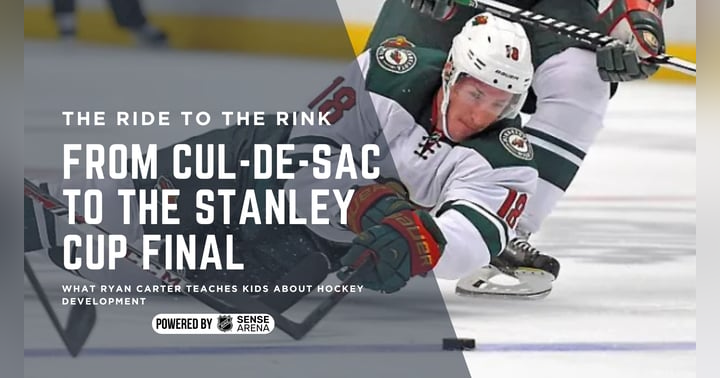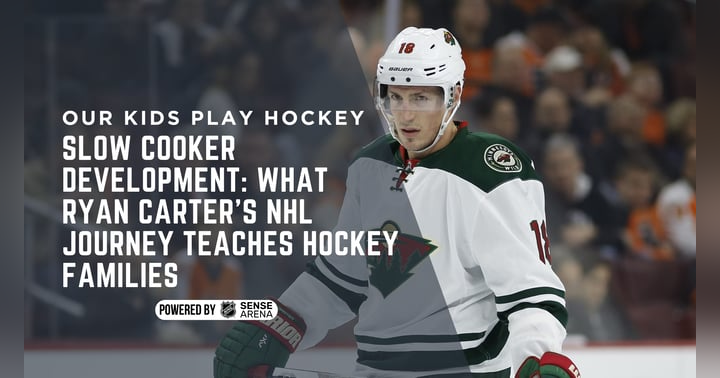Do Early Hockey Stars Stay Ahead? What Every Parent Should Know.

Do Early Hockey Stars Stay Ahead? What Every Parent Should Know
One of the most common questions hockey parents ask is this: If my child starts training extra early or dominates at 8U, will they stay ahead long term?
It’s a great question—and one the Our Kids Play Hockey team tackled in a recent episode, thanks to listener Tony. The discussion goes beyond stats and scores to address the bigger picture of player development, motivation, and long-term success in youth hockey.
Here are the key takeaways every hockey parent should consider:
Extra Ice Time Can Help—But Only If Your Kid Wants It
More ice time at ages 8, 10, or 12 can offer a clear advantage. Skating is the most critical skill in hockey, and repetition builds confidence. But as Lee Elias and Mike Bonelli emphasized, forcing ice time on an uninterested kid can backfire. Burnout is real. If your child is excited to skate more—go for it. If they’re resisting, it’s okay to ease up.
“You do it because the kid wants to do it. Not because you’re pressured by other parents.” – Lee Elias
2. Early Growth Spurts Can Be Misleading
Some kids dominate early because they hit growth spurts or develop coordination sooner. They might be taller, faster, and stronger at 8U or 10U—but that doesn’t mean they’re more skilled. Once other players catch up physically, the early advantage often fades.
Key point for parents: Don’t confuse early size or speed with long-term superiority. The playing field levels out—and sometimes reverses.
3. Talent Shouldn’t Trump Team Play
Yes, some young players can skate through entire teams and score at will. But focusing solely on individual performance creates bad habits—puck hogging, skipping passes, ignoring defensive play. Coaches and parents must guide talented kids toward team-oriented hockey.
“A good player scores goals. A great player makes everyone around them better.” – Lee Elias
4. Bad Habits Are Hard to Break
Over-reliance on one move or flashy play at a young age can hinder development later. Kids who never had to pass, defend, or adjust to systems struggle as the competition improves.
Watch out for:
- Over stickhandling
- Playing one-on-five
- Avoiding passes
- Poor skating mechanics
Building hockey IQ and a complete skill set early on is more valuable than highlight-reel goals.
5. The Late Bloomers Often Win the Long Game
Some of the most successful players are the ones who started late or were never the stars early on. They were coachable, resilient, and hungry to learn. These are the “grinders”—the players who put in the work at 11, 12, and beyond.
Lee and Mike shared their own stories of starting later than peers but surpassing them through effort and mindset. It’s not just about raw talent—it’s about growth, both on and off the ice.
So, What Should Parents Focus On?
Here’s a quick checklist for supporting your hockey player’s development:
- ✅ Encourage extra ice time only if your child is motivated
- ✅ Reinforce teamwork and sportsmanship
- ✅ Focus on skating, hockey IQ, and complete skill development
- ✅ Celebrate assists and smart plays—not just goals
- ✅ Support coachability, effort, and learning from mistakes
- ✅ Remember: development is not linear
“Just because they’re ahead doesn’t mean they’re advancing.” – Lee Elias
Final Word: It’s a Journey, Not a Sprint
Your child’s hockey path is unique. Whether they start strong or take time to find their stride, the key is long-term development, love of the game, and a balanced mindset. Enjoy the ride—and remember, they only get to be kids once.
If this episode hit home for you, share it with a fellow hockey parent. And don’t forget to check out other great episodes at ourkidsplayhockey.com.
Want your question answered on the show? Send it in—your curiosity helps grow the game for everyone!


